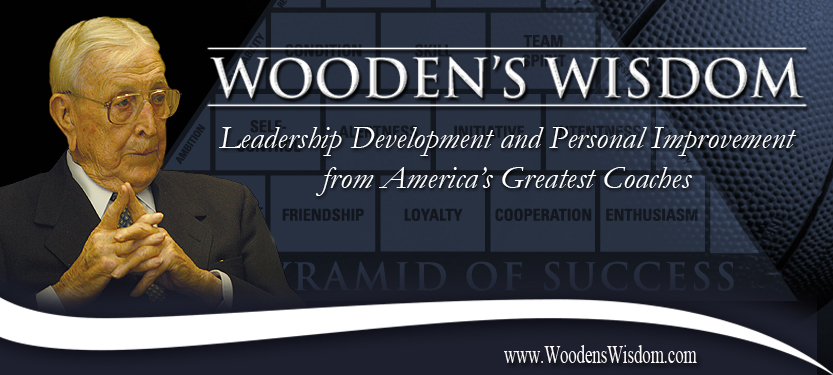
|
|
| Wooden's Wisdom - Volume 9 | Issue 380 |
| Craig Impelman Speaking | Championship Coaches | Champion's Leadership Library Login | |
|
THE POSITIVE APPROACH (PETE NEWELL PART TWO) Hall of Fame coach Pete Newell (1915 –2008) was considered "America's Basketball Guru". Coach Newell was an excellent teacher and part of his "Positive Approach" was that he focused on telling his players what "to do" as opposed to telling them "what not to do." Newell"s communication was centered on "do this" not "don’t do that". "Take good shots as opposed to don’t take bad shots." In the Bruce Jenkins book A Good Man: The Pete Newell Story (1999) Coach Newell expanded on this idea:
"I always taught the value of the ball," Newell says, "and I'd teach ball possession in a positive way. I'd put my regulars on defense and play the second team on offense in practice. We'd play a 10-point game with a lot of pressing. Every time we forced a turnover, we get a point Positive rein¬forcement. Rather than say, 'Don't do this,' it was more like, 'When you force the opponent to throw the ball away, you're costing them a point:
This is why teams play championship games so negatively. Especially the Super Bowl, with that two-week break; it's all negatives. Don't do this, don't let 'em beat you here, don't let 'em beat you there, don't don't don't. Next thing you know, you've had just enough time to figure out what can go wrong. Later you wonder, 'Jeez, our guys sure came out flat: That's because they were coached to be flat. We all fall into this trap if we allow it. I used to tell our guys, the first time they get the ball, I want you to play a full-court press and go hard after the ball. I don't care if you get a foul. Let's make sure we're the first ones to do something."
Coach Newell was equally insistent that his players had a positive mind set. In the same book Bruce Jenkins tells a great story to illustrate this:
"Newell could not tolerate whiners or negative thinkers, and he had memorable ways of proving his point. One particular player, a sophomore starter, decided he didn't like the rims at the University of Wisconsin. It was his first game there, and he returned angrily to the bench after warmups.
"These are terrible backboards," he said. "Terrible rims" "Do they really bother you?" Newell asked him. "Yeah:' Newell immediately went to the scorer's table and announced a sub¬stitution. Sophomore out, somebody else in. The kid couldn't believe it.
"I don't want people having emotional problems when they go on the court," Newell told him. "You seem to have one with the backboards and rims here, so I'm going to take that problem away from you. You'll watch the game with me tonight."
Newell never did play the kid that night "I was trying to teach him ¬and all my players - that you can't have everything you want in life. If the rims aren't right so be it. If it means a longer rebound, you make that adjustment. You simply don't start throwing rocks at the other team or allow this negativism. And I never heard another word, from him or any¬body else, about negative things on the other person's court."
Do you take the "Positive Approach"?
Yours in Coaching, Craig Impelman
|
Punishment Their childhood is so brief that we Edgar Allen Guest (1881-1959)
|
|
For more information visit www.woodenswisdom.com |
|
© Copyright 2024 WoodensWisdom.com | # of Times Wooden's Wisdom Issues Opened: 6,737,251
Hosting & Design by:EverydayWebDesign.com